Origin representatives and the magic number required to win an NRL title
What makes up a premiership team? As DAVID RICCIO discovers, most of the NRL’s 17 clubs are lacking the key ingredient needed to be a true contender.
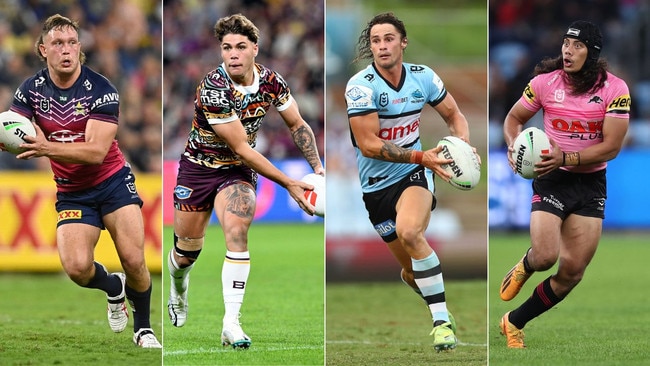
NRL
Don't miss out on the headlines from NRL. Followed categories will be added to My News.
The 40-year formula to winning NRL premierships can be revealed.
It shines a spotlight on why the Knights should be going better than what they are.
It underlines how much work Shane Flanagan has to do at St George-Illawarra, and why the Roosters are over-hyped.
It puts a new perspective on just how far the Sharks are over-achieving under Craig Fitzgibbon, and likewise Ricky Stuart’s Raiders.
And it drops a dirty big question mark on the feel-good story of the year, the Warriors, who will need to do what only one club, the Wests Tigers in 2005, have managed to achieve since 1983.
The brutal reality of the statistical analysis is this: You must have four State of Origin players.
It’s good news for Eels, Rabbitohs, Broncos, Cowboys and Panthers fans.
Which means you can immediately put a line through eight teams for what remains of 2023 -
the Roosters, Bulldogs, Raiders, Tigers, Dolphins, Sharks, Dragons and yes sadly, even the Warriors.
Like the Wests Tigers in 2005, the Warriors have no Origin players.
And unless they get moving in recruitment, or experience a rapid upswing in individual improvement next season, or the season after, it will be no different.
The formula is so clear and so damning, that every recruitment boss, chair and CEO at all 17 clubs should be doing a deep dive on their recruitment strategy if they are serious about winning premierships.
The formula speaks to current State of Origin representation at your club.
An annual burden lumped into the middle of an NRL season, Origin is viewed by many club-first fans as an unnecessary evil that gets in the way of the best competition in the world.
Yet cut the numbers and it reveals just how pivotal Origin is for your side and how the big-game experience of Origin is key to your club’s pursuit of going all the way on grand final day.
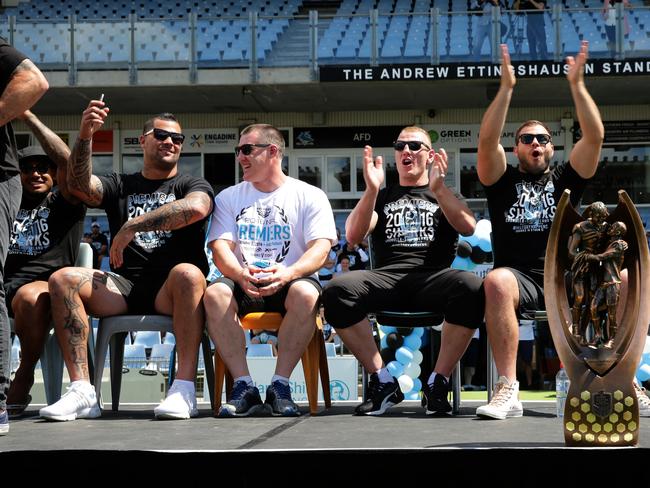
Talk to NRL coaches and they explain how Origin players change when the weather warms in September. Sharks coach Shane Flanagan spoke about it in his 2016 press conference after winning the premiership with Cronulla with four Origin players.
“Early days when I started coaching Cronulla, the only rep player we had was Gal (Paul Gallen),’’ Flanagan said.
“I needed to get some rep players into the club and Luke Lewis was still playing Origin. So we got him here with Wade Graham and then James Maloney.
“Good players stand up in Origins and semi-finals. And I noticed that steely focus over the past month with those guys.’’
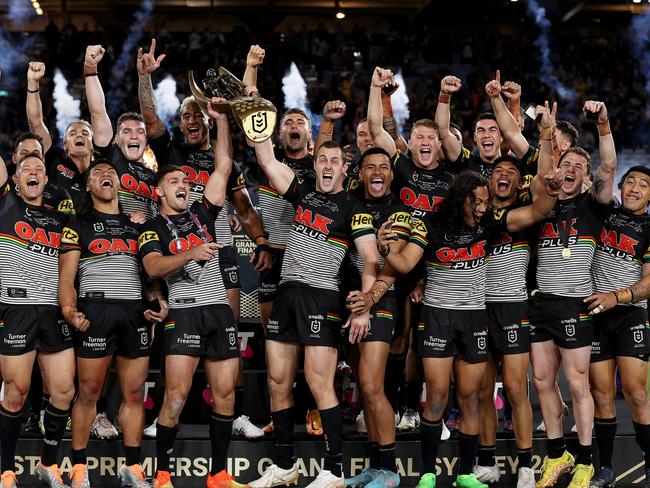
What the statistics show is that the aim of every club, albeit salary cap challenging, is to boast at least four current Origin players within your roster.
That’s the magic number when it comes to winning on the first weekend of October.
Thirty-two of the past 40 premiers have had four or more current Origin players on their books in the year they won the competition.
Take a second to read that again.
Thirty-two of the past 40 premiers have had four or more current Origin players on their books in the year they won the competition.
It’s damning.
The past three premiers, Penrith (2022, 2021) and Melbourne (2020) had seven Origin players from the corresponding season.
This season, only the high-flying Panthers (6), Cowboys (5), Broncos (5), Rabbitohs (5), Titans (4) and Eels (4) fit the ‘magic number’ category.
From that list, the Titans (14th) are the anomaly as the only team without a hope of saluting in October.
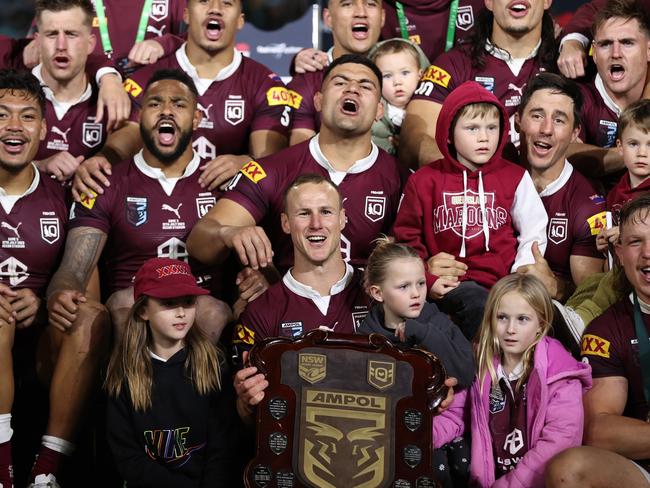
However, with 2023 Maroons team members Tino Fa’asuamaleaui, David Fifita, Moeaki Fotuaika and AJ Brimson on their books, we can now get a sense as to why a fed-up Gold Coast board were so militant in sacking former coach Justin Holbrook.
The Fox Sports Lab statistics prove that with anything less than four current Origin players in your team, and your club is effectively wasting their time or trying to buck a 40-year trend.
Since 1983, only eight teams have won the premiership, with three or less Origin players.
And it’s been almost a decade since that happened.
South Sydney did it in 2014 when they had three Queensland players in Greg Inglis, Ben Te’o and Chris McQueen in their side.
This season, the Storm, Sea Eagles and Knights have only three current Origin players on their books.
Again, if they win this year’s premiership, they will need to do what no team has done since Souths almost 10 years ago.
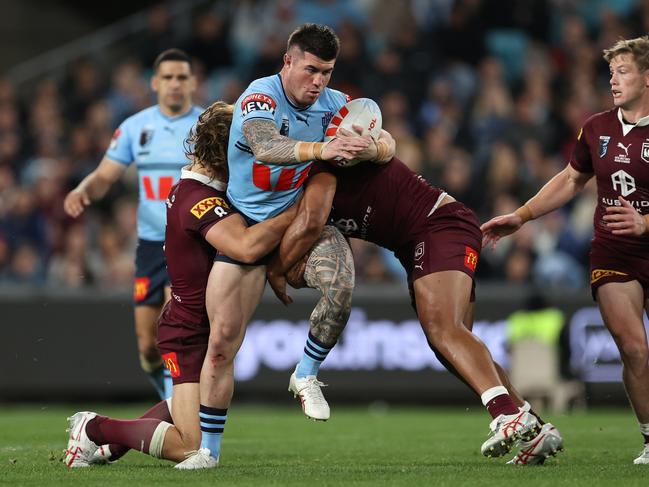
However, in an insight into why the noise won’t go away around Knights coach Adam O’Brien, Newcastle’s Origin representative count of Tyson Frizell, Jacob Saifiti and Bradman Best could easily be four, as it doesn’t include captain Kalyn Ponga, who would’ve replaced Reece Walsh in Origin III, had he said yes to Billy Slater’s phone call.
Generally there’s a clear line that can be drawn from the top of the NRL ladder to the bottom by simply analysing Origin representation at every club.
The majority of those clubs that sit at the bottom of the ladder, including the Dragons (1), Tigers (2), Dolphins (2), Roosters (2) and Bulldogs (2), have the smallest amount of Origin players.
That is, except for the Raiders (2), Sharks (1) and Warriors (0).
The Raiders’ push for a top-four berth with just two Origin players is a slap in the face to all of Stuart’s critics.
At Cronulla, the Sharks are clinging to a spot inside the top eight and have been under pressure to beat top eight sides.
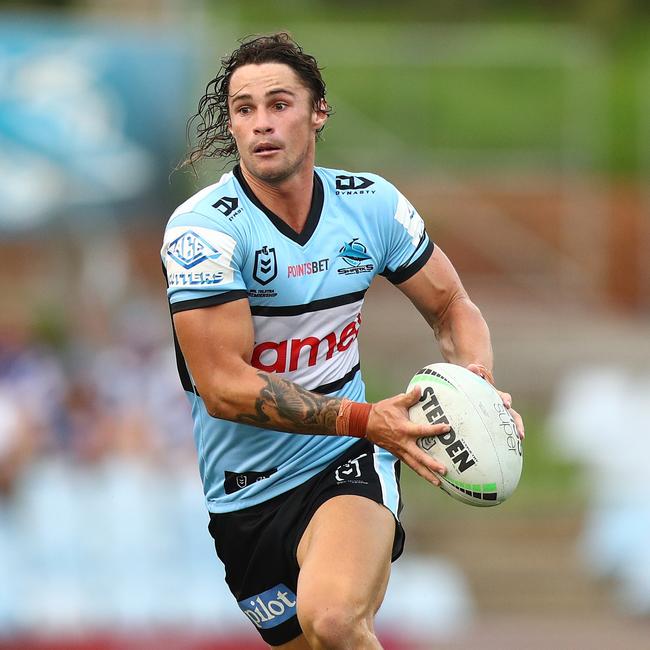
Yet their roster suggests it is in urgent need of big-game experience with an 11-minute cameo at right centre for the Blues in game one this year by halfback Nicho Hynes, their only level of Origin representation.
The argument that the formula does not apply to the Warriors isn’t without merit. Their squad features a large majority of Kiwi and Pacific Island players.
However, it could also be said that their lack of Origin experience only amplifies the job of rookie coach Andrew Webster, who doesn’t have players that have experienced the intensity of Origin.
The Warriors have proven they are a club that can handle adversity.
But to claim their first premiership, as the formula shows, they will need to do what only the fairytale Wests Tigers have done in 40 years.
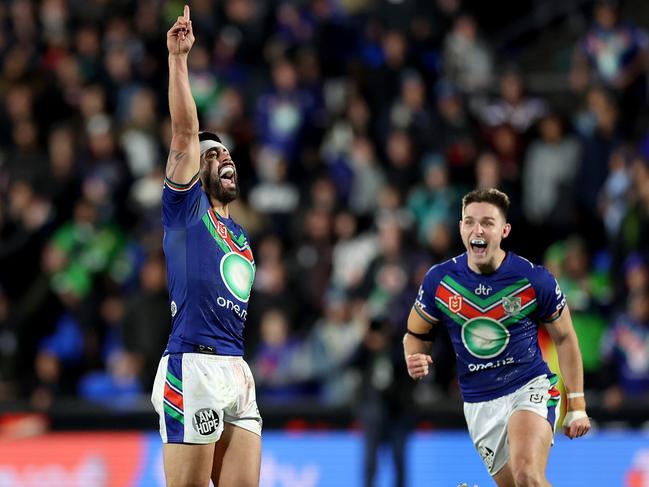
NRL PREMIERS AND THEIR ORIGIN PLAYERS
2022: Panthers, seven (Isaah Yeo, Nathan Cleary, Jarome Luai, Liam Martin, Brian To’o, Stephen Crichton, Apisai Koroisau)
2021: Panthers, six (Kurt Capewell, Isaah Yeo, Nathan Cleary, Jarome Luai, Liam Martin, Brian To’o, Apisai Koroisau)
2020: Storm, seven (Christian Welch, Cameron Munster, Josh Addo-Carr, Tino Fa’asuamaleaui, Felise Kaufusi, Dale Finucane, Brenko Lee)
2019: Roosters, four (Boyd Cordner, James Tedesco, Latrell Mitchell, Angus Crichton)
2018: Roosters, four (Boyd Cordner, Dylan Napa, James Tedesco, Latrell Mitchell)
2017: Storm, seven (Cooper Cronk, Nate Myles, Will Chambers, Cameron Smith, Billy Slater, Tim Glasby, Cameron Munster)
2016: Sharks, five (Paul Gallen, James Maloney, Andrew Fifita, Jack Bird, Wade Graham)
2015: Cowboys, four (Johnathan Thurston, Matthew Scott, James Tamou, Michael Morgan)
2014: Rabbitohs, three (Greg Inglis, Ben Te’o, Chris McQueen)
2013: Roosters, four (Mitchell Pearce, Michael Jennings, James Maloney, Boyd Cordner)
2012: Storm, four (Cameron Smith, Billy Slater, Cooper Cronk, Dane Nielsen)
2011: Sea Eagles, four (Jason King, Anthony Watmough, William Hopoate, Glenn Stewart)
2010: Dragons, seven (Brett Morris, Darius Boyd, Ben Creagh, Neville Costigan, Michael Weyman, Matt Cooper, Beau Scott)
2009: Storm, five (Cameron Smith, Billy Slater, Dallas Johnson, Greg Inglis, Brett White)
2008: Sea Eagles, one (Brett Stewart)
2007: Storm, seven (Cameron Smith, Dallas Johnson, Antonio Kaufusi, Matt King, Brett White, Greg Inglis, Ryan Hoffman)
2006: Broncos, nine (Shaun Berrigan, Petero Civoniceva, Darren Lockyer, Brent Tate, Justin Hodges, Tonie Carroll, Sam Thaiday, David Stagg, Karmichael Hunt)
2005: Tigers, zero
2004: Bulldogs, five (Willie Mason, Mark O’Meley, Steve Price, Andrew Ryan, Willie Tonga)
2003: Panthers, one (Scott Sattler)
2002: Roosters, four (Chris Flannery, Bryan Fletcher, Justin Hodges, Luke Ricketson)
2001: Knights, four (Matthew Gidley, Mark Hughes, Ben Kennedy, Adam MacDougall)
2000: Broncos, seven (Ben Ikin, Darren Lockyer, Gorden Tallis, Shane Webcke, Tonie Carroll, Brad Thorn, Wendell Sailor)
1999: Storm, four (Matt Geyer, Rodney Howe, Robbie Ross, Glenn Lazarus)
1998: Broncos, twelve (Shane Webcke, Darren Smith, Tonie Carroll, Kevin Walter, Peter Ryan, Steve Renouf, Wendell Sailor, Allan Langer, Darren Lockyer, Gorden Tallis, Brad Thorn, Andrew Gee)
1997: Broncos, Tri Series
1997: Knights, four (Andrew Johns, Robbie O’Davis, Adam Muir, Paul Harragon)
1996: Sea Eagles, three (Steve Menzies, Geoff Toovey, Owen Cunningham)
1995: Bulldogs, three (Brett Dallas, Dean Pay, Jason Smith)
1994: Raiders, seven (Mal Meninga, Laurie Daley, Ricky Stuart, Steve Walters, Bradley Clyde, Ken Nagas, Brett Mullins)
1993: Broncos, ten (Andrew Gee, Allan Langer, Mark John, Glenn Lazarus, Kevin Walters, Michael Hancock, Steve Renouf, Willie Carne, Chris Johns)
1992: Broncos, nine (Allan Langer, Gavin Allen, Trevor Gillmeister, Glenn Lazarus, Kevin Walters, Michael Hancock, Steve Renouf, Willie Carne, Chris Johns)
1991: Panthers, five (Brad Fittler, Greg Alexander, Mark Geyer, John Cartwright, Brad Izzard)
1990: Raiders, eight (Gary Belcher, Gary Coyne, Mal Meninga, Bradley Clyde, Glenn Lazarus, Laurie Daley, Ricky Stuart, Steve Walters)
1989: Raiders, eight (Gary Belcher, Gary Coyne, John Ferguson, Mal Meninga, Bradley Clyde, Glenn Lazarus, Laurie Daley, Kevin Walters)
1988: Bulldogs, five (Tony Currie, Steve Folkes, Terry Lamb, Paul Langmack, Paul Dunn)
1987: Sea Eagles, seven (Noel Cleal, Michael O’Connor, Paul Vautin, Dale Shearer, Des Hasler, Cliff Lyons, Phil Daley)
1986: Eels, three (Brett Kenny, Peter Sterling, Eric Grothe Snr)
1985: Bulldogs, three (Chris Mortimer, Steve Mortimer, Peter Tunks)
1984: Bulldogs, seven (Ross Conlon, Andrew Farrar, Terry Lamb, Steve Mortimer, Peter Tunks, Michael Potter, Chris Mortimer)
1983: Eels, nine (Steve Ella, Eric Grothe Snr, Geoff Budgen, Brett Kenny, Ray Price, Peter Sterling, Michael Cronin, Neil Hunt, Stan Jurd)
More Coverage
Originally published as Origin representatives and the magic number required to win an NRL title





